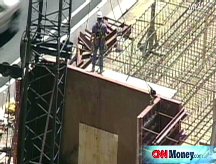Keeping stimulus spending on a leash
Aggressive auditing and online tracking databases are two ideas for preventing more bridges to nowhere.
 |
| Cash for roads, bridges, and other infrastructure projects should be subject to strict audits and tracked online, experts say. |
NEW YORK (CNNNMoney.com) -- A better recipe for disaster hardly seems possible: Allow politicians to take billions of dollars of your money and dole it out to other politicians, who then give it to other government administrators. All of whom ask you to trust that the funds will be spent wisely.
Yet that's a big part of President-elect Obama's plan to jumpstart the economy. Over the next few months he wants to spend at least $100 billion dollars on roads, bridges, schools, water lines, police and energy projects.
"Our system is fraught with risks. We've squandered billions of dollars in the past on politically motivated projects," said Maya MacGuineas, president of the Committee for a Responsible Federal Budget, a non-partisan watchdog group.
So to how ensure that taxpayer money is putting people to work and growing the economy - not just building more bridges to nowhere?
For starters, don't build any new bridges. Most experts say the money should be spent repairing and maintaining existing structures, rather than embarking on bold new projects.
This not only reduces the chances for pork barrel spending, it puts people to work fast (rather than after years of planning) and can be stopped quickly if the economy bounces back and inflation becomes a problem.
MacGuineas also says these infrastructure projects should be subject to audits that ensure they are providing the jobs and economic benefit promised. She recommends the Government Accountability Office conduct them.
A spokesman for the GAO, which keeps tabs on how the federal government spends its money, couldn't comment on speculative policy. But he did point out that the GAO already reports to Congress on how the $700 billion in bailout funds are being spent.
Building America's Future, a group of state and local officials lobbying for stimulus through more federal infrastructure spending, would like to see reporting be more transparent. As such, it is calling for audits to Obama's infrastructure plan to be posted online in a publicly searchable database.
"The public is unhappy," said Polly Trottenberg, BAF's executive director. "We don't know how we spend transportation dollars...and in some places there's a disconnect between what the states are doing, and what the people want or what the nation needs."
"We're saying give us more money, but we're going to show you that we're going to spend it responsibly," she added.
That doesn't convince Tom Schatz, president of the watchdog group Citizens Against Government Waste. He doubts whether job creation can be accurately calculated, let alone determine the resulting economic benefits to an area.
"Members of Congress are often told what they want to hear," he said. "The decisions that will be made in Washington will be made based on politics, not results." ![]()


